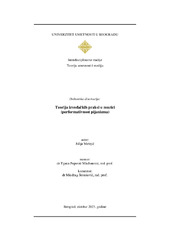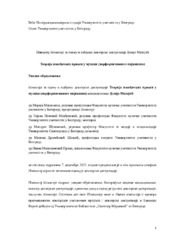| dc.contributor.advisor | Popović Mlađenović, Tijana | |
| dc.contributor.other | Masnikosa, Marija | |
| dc.contributor.other | Dragićević Šešić, Milena | |
| dc.contributor.other | Miladinović Prica, Ivana | |
| dc.creator | Matejić, Julija | |
| dc.date.accessioned | 2023-12-11T10:22:25Z | |
| dc.date.available | 2023-12-11T10:22:25Z | |
| dc.date.issued | 2024-04-23 | |
| dc.date.submitted | 2023-12-11 | |
| dc.identifier.uri | http://eteze.arts.bg.ac.rs/handle/123456789/646 | |
| dc.description.abstract | Nasuprot (tradicionalnom) poistovećivanju muzičkog dela s partiturom, koncept muzike kao izvođenja neuporedivo više odgovara muzičkoj praksi kakvu poznajemo. Kao umetnički ritual, muzičko izvođenje je tipičan primer izvođenja (u smislu telesne radnje koja proizvodi značenje). Proučavanje muzičkog izvođenja nije novina za muzičare, muzikologe i teoretičare (što pokazuje iscrpan pregled literature); ipak, interdisciplinarne studije izvođenja – tačnije, studije o izvođenju – omogućile su potpuno nove pristupe razumevanju ovog fenomena.
Za razliku od preovlađujućeg pozitivističko-formalističkog pristupa u muzikologiji i ignorisanja muzičkog izvođenja u oblasti studija o izvođenju, ova disertacija zasnovana je na konceptu performativnosti – jednoj od centralnih tema studija o izvođenju – s polaznom hipotezom da izvođač ima određenu moć da čini nešto u izvođenju i interpretiranju muzike. Identifikujem pet kategorija performativnosti muzičkog izvođenja: 1) stvaranje muzičkog značenja u izvođenju, 2) proizvodnju znanja umetničkim istraživanjem, 3) transportaciju i 4) transformaciju izvođača u procesu izvođenja, kao i 5) dejstvo izvođenja na slušaoce – afekt.
Kao odgovor na širok spektar pristupa razumevanju ontološkog statusa muzičkog dela, nudim teorijski okvir koji spaja aktuelnosti i virtuelnosti – fiziku i metafiziku. Kroz ideju da se izvođenjem ne predstavlja, već (pro)izvodi značenje, štaviše, da je muzičko delo fluidni entitet koji se neprestano iznova oblikuje i nadograđuje, akcenat je na performativnoj dimenziji muzike. Naime, svaka performativna interpretacija u fuziji s partiturom rezultira izvedbom (kao višim entitetom), uz oslobađanje energije u vidu afekta (direktnog dejstva muzike na telo slušaoca). U svojoj jedinstvenosti i neponovljivosti, izvedba tako predstavlja samostalnu verziju (tj. eho) muzičkog dela – tačnije: (((dela))). Ovaj teorijski okvir dodatno je potvrđen (kvantitativnom i kvalitativnom) empirijskom analizom Rihterovih (Sviatoslav Richter) i Guldovih (Glenn Gould) izvedbi Bahovog (Johann Sebastian Bach) Italijanskog koncerta.
Budući da muzičari aktivno učestvuju u kreativnom procesu stvaranja (značenja) muzike, zaključujem da (u muzici) nisu samo kompozitori autori, već i izvođači – kao autori izvedbi – koji muziku čine auditivnom umetnošću i predaju je slušaocima na dalje interpretiranje. | en |
| dc.description.abstract | Contrary to the (traditional) identification of a musical work with its score, the concept of music as performance is incomparably more aligned with the music practice as we know it. As an artistic ritual, a musical performance is a typical example of a performance (in the sense of a bodily action that produces meaning). The study of musical performance is not new to musicians, musicologists, and theorists (as the exhaustive bibliographical review shows); however, the interdisciplinary performance studies have enabled entirely new approaches to understanding this phenomenon.
Countering the prevailing positivist-formalist approach in musicology as well as the overlooking of the musical performance itself in the field of performance studies, this dissertation is based on the concept of performativity – one of the central themes of performance studies – with the starting hypothesis that the performer has a certain power to do something in performing and interpreting music. I identify five different categories of performativity of a musical performance: 1) the creation of the musical meaning in a performance, 2) the production of the knowledge in the process of artistic research, 3) the transportation and 4) the transformation of the performer in the process of performing, as well as 5) the effect of a musical performance on listeners – affect.
In response to a wide range of approaches to understanding the ontological status of a musical work, I offer a theoretical framework that combines actuality and virtuality – physics and metaphysics. The emphasis is on the performative dimension of music through the idea that the performance does not represent, but produces meaning, moreover, that a musical work is a fluid entity that is continuously reshaped and built upon. Namely, every single performative interpretation in fusion with the score results in a performance (as a higher entity), with the release of energy in the form of the affect (direct effect of music on the listener’s body). In its uniqueness and unrepeatability, the performance thus represents an independent version (i.e., an echo) of the musical work – more precisely: (((work))). This theoretical framework is additionally confirmed by (both the quantitative and the qualitative) empirical analysis of Sviatoslav Richter’s and Glenn Gould’s performances of Bach’s Italian Concerto.
Since musicians actively participate in the process of creating (the meaning of) music, I conclude that (in music) it is not only the composers who are the authors, but also the
performers – as authors of performances – who turn music into an auditory art and bestow it upon listeners for further interpretation. | en |
| dc.language.iso | sc | en |
| dc.publisher | Универзитет уметности у Београду, Интердисциплинарне студије Универзитета уметности | sr |
| dc.source | Интердисциплинарне студије Универзитета уметности | sr |
| dc.subject | izvođenje, pijanizam, performativnost, umetničko istraživanje, virtuoznost, aura, afekt | en |
| dc.subject | performance, pianism, performativity, artistic research, virtuosity, aura, affect | en |
| dc.title | Teorija izvođačkih praksi u muzici (performativnost pijanizma) | en |
| dc.type | doctoralThesis | en |
| dc.contributor.coadvisor | Šuvaković, Miodrag | |


